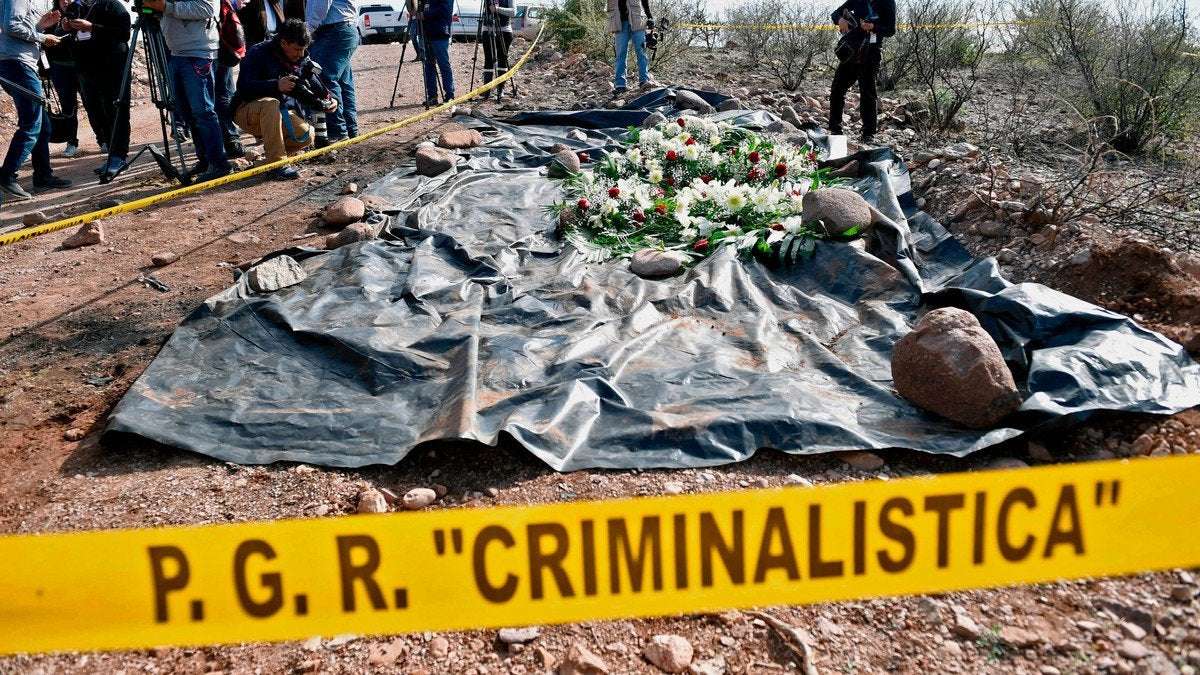The press surrounds a site where nine Mormon women and children were murdered in November 2020 in a cartel ambush in Chihuahua state, Mexico. Photo by ALFREDO ESTRELLA/AFP via Getty Images.
A Mexican politician says he’s acting as a middleman between drug cartels and the government in an unprecedented attempt to strike a peace deal amid a spike of violence related to the drug business.
Reaching a peace deal between the Mexican government and drug cartels could be Mexico’s only option to stop the violence, Manuel Espino Barrientos, a federal congressman from the ruling party MORENA said during a Senate security meeting last week.
“I handed over a proposal to the Interior Secretary to reach a pact with some of the organized crime groups in Mexico, and I reached out to them too,” Espino said. “Only two of them reached back to me, and said, ‘If this is really happening, we are in.’”
Espino did not specify which cartels he reached out to or which two agreed to the proposal.
The congressman said that the rate of violence in Mexico “is at its worst” and that there are only two options left: “To keep things as they are, with the consequences we know, or to open a dialogue with the criminal organizations.”
“I will not reveal more because it could jeopardize the talks, but this kind of thing always works out. I saw it myself in Ciudad Juárez and in El Salvador and also in Colombia,” he said.
Espino laid out his plan if the government were to agree: “We would give the criminal organizations guarantees for them to integrate into the legal economy, and in exchange they will stop working on all the illegal activities.”
Mexican President Andrés Manuel López Obrador denied the possibility of a pact during his daily morning conference on Friday.
“We don’t have any agreement or pact [with criminal organizations]. We have our limits very clear: On one side the authority, and on the other the criminals,” López Obrador said.
Espino’s proposal would be the first official agreement of its kind in Mexico, but it is an established strategy in Colombia, where several governments have negotiated or tried to broker peace pacts with criminal organizations and guerrilla groups, with mixed results.
Political and security analyst Alejandro Hope said that a peace negotiation could be a solution to Mexico’s chronic violence, but that Espino’s proposal was “at best, naive.”
“If you are going to have peace talks or a negotiation between armed groups and the government, you need to make them part of the constitution, provide a legal proposal for it with an explicit policy on how you are going to do this,” Hope told VICE World News.
During the rule of the PRI political party—Mexico was governed by PRI for 70 years up until 2000—the rumor of a truce between narcos and officials prevailed, leading many to think that Mexico was less violent because of those unofficial agreements, where each criminal organization was allotted its own territory and stuck to it.
“But that was not a negotiation either. That was a complicit relationship where both government officials and criminals were sharing the illegal money,” Hope said.
“Another issue that a negotiation like this would face is who would be included in these negotiations? Who is and who isn’t a Sinaloa Cartel or Jalisco Cartel member?” Hope added.
Most recently, Mexico’s clergymen called for a “social pact” with drug traffickers after the murder of two Jesuit priests inside a church.

sciguy52 on November 2nd, 2022 at 01:47 UTC »
This kind of misses the point. They provide an out to a few cartels to become legal, so they stop the drugs and live openly as billionaires. But that changes nothing. The demand for drugs is still there, the profits associated with those drugs are still there, the willingness of other criminals to sell those drugs and make those profits is still there. Basically you let some guys get off scot free, the the problem remains. Some other cartel will take their place. Then what? Let them go legal, then another cartel, legalize them, then another. This will also make the situation more violent as the new cartels compete. Crazy.
WestyJZD on November 2nd, 2022 at 00:46 UTC »
Another big problem is that it isn't just drugs they traffic and make. Its human trafficking etc. They have gone into almost every sector. They even take trucks and steal entire fields of farmers harvests like almonds, avocados etc. In fact farming thievery is up alot in central california, and many farmers and towns have had to hire either detective or guards to watch some high profit crops like almonds.
d36williams on November 2nd, 2022 at 00:36 UTC »
They want to legitimately cook meth?